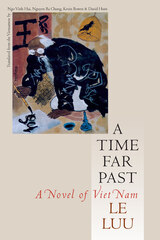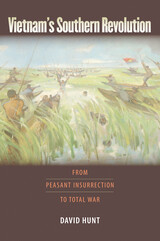2 books about Hunt, David

A Time Far Past
A Novel of Viet Nam
Le Luu
University of Massachusetts Press, 2017
This epic novel presents a sweeping portrait of war and peace in northern Vietnam from the defeat of the French to the mid-1980s. The story follows the odyssey of Giang Minh Sai, the son of a Confucian scholar in the rural Red River delta, from his early childhood through his decorated service during the American War and his later efforts to adapt to the postwar world of urban Ha Noi. Through two failed marriages, Giang Minh Sai struggles to come to terms with his responsibilities, his past, and his future. The novel's ending leaves its hero and Vietnamese socialism at a problematic and painful crossroads.
In its intricate sketching of complicated alliances, personal debts, and human interactions, A Time Far Past explores the complex layering of family and village history and Party and feudal authority. It also paints a vivid picture of the vast dislocations in Vietnamese culture caused by the political and military turmoil of the Indochina wars.
A Time Far Past was enormously popular in Vietnam, where it was first published in 1986, selling more than 120,000 copies and winning that country's national prize for fiction.
In its intricate sketching of complicated alliances, personal debts, and human interactions, A Time Far Past explores the complex layering of family and village history and Party and feudal authority. It also paints a vivid picture of the vast dislocations in Vietnamese culture caused by the political and military turmoil of the Indochina wars.
A Time Far Past was enormously popular in Vietnam, where it was first published in 1986, selling more than 120,000 copies and winning that country's national prize for fiction.
[more]

Vietnam's Southern Revolution
From Peasant Insurrection to Total War
David Hunt
University of Massachusetts Press, 2009
In Vietnam, the American government vowed to win the "hearts and minds" of the people. On the other side, among those who led and sympathized with the insurgents, the term "people's war" gained a wide currency. Yet while much has been written about those who professed to speak for the Vietnamese population, we know surprisingly little about the everyday life of the peasants who made up the bulk of the country's inhabitants. This book illuminates that subject. Drawing on a wide range of sources, including interviews conducted by the Rand Corporation with informants from My Tho Province in the Mekong Delta, David Hunt brings to light the daily experience of villagers in the midst of war and revolution.The peasants of southern Vietnam were neither onlookers nor mere victims as fighting raged throughout their country. From the "concerted uprising" in 1959–1960 to the Tet Offensive of 1968, the revolutionary movement they created was in fact the driving force within the war. Known as the "Viet Cong" to their adversaries, the rebels called themselves the "Liberation Front." They demanded an end to landlordism and an egalitarian distribution of the means of subsistence as well as a democratization of relations between town and countryside, parents and children, men and women. They hoped the Vietnamese people would achieve a fuller sense of their place in the world and of the power they possessed to fashion their own destinies, without reliance on supernatural forces.In the first half of the book, Hunt analyzes this cultural revolution. As fighting spread and became more destructive, especially after the U.S. escalation in 1965, villagers were driven from their homes, the rural infrastructure collapsed, and customary notions of space and time lost purchase on an increasingly chaotic world. In the second half of the book, Hunt shows how peasants, who earlier had aspired to a kind of revolutionary modernism, now found themselves struggling to survive and to cope with the American intruders who poured into My Tho, and how they managed to regroup and spearhead the Tet Offensive that irrevocably altered the course of the war.
[more]
READERS
Browse our collection.
PUBLISHERS
See BiblioVault's publisher services.
STUDENT SERVICES
Files for college accessibility offices.
UChicago Accessibility Resources
home | accessibility | search | about | contact us
BiblioVault ® 2001 - 2025
The University of Chicago Press









